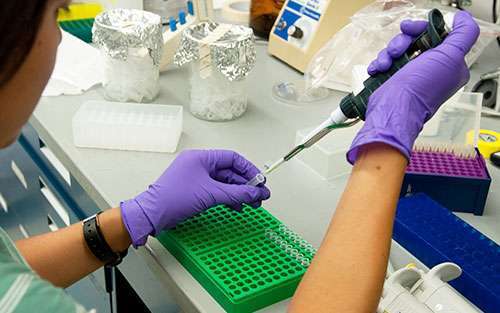
A collaborative effort between researchers at the Fred Hutchinson Cancer Research Center, the University of Washington and Massachusetts Institute of Technology has led to the reporting of an implantable “scaffold” device that delivers immunotherapy drugs to pancreatic tumors in mice.
Published in the Journal of Clinical Investigation, the study describes a device that can be implanted into pancreatic tumors and then dissolves. One of the challenges to pancreatic cancer immunotherapy approaches has been the tumor’s ability to evade an immune response. Specifically, pancreatic tumors can prevent the recruitment of T-cells, immune cells that could otherwise recognize and attack the cancer cells as foreign.
The new study utilizes the scaffold device to deliver T-cells directly to the tumor that are trained to recognize proteins expressed on the cancer cells. The researchers also added a factor, called STimulator of INterferon Genes (STING), which further activates the immune system and ensures that the response is sustained.
In preliminary experiments in mice genetically programmed to develop pancreatic cancer, the researchers’ device improved survival significantly.
“Immunotherapy approaches have not yet yielded major clinical successes in the treatment of pancreatic cancer patients,” said Lynn Matrisian, PhD, MBA, chief science officer at the Pancreatic Cancer Action Network. “The strategy described in the Journal of Clinical Investigation paper represents a novel, thoughtful way to deliver immunotherapy drugs and agents to pancreatic cancer cells and circumvent their ability to hide from anti-cancer immune cells.”
The Pancreatic Cancer Action Network’s Research Grants Program also supports several immunotherapeutic approaches, including both preclinical and clinical analyses.
“We have deepened our understanding of the relationship between the immune system and pancreatic cancer cells,” added Matrisian. “To create a successful immunotherapy strategy that will improve pancreatic cancer patient outcomes, the treatment will need to include a way to activate the immune system while also blocking the cancer cells’ ability to avoid an immune attack. Encouragingly, several research groups, including the ones who conducted this study, are devising novel approaches to achieve this goal.”
To learn more about this study, immunotherapy and other treatment options for pancreatic cancer patients, please contact a PanCAN Patient Services Case Manager.





